 The frequencies 1781.7-1785MHz paired with 1876.7-1880MHz known as the GSM Guard bands have been made available to 12 licensees under the Wireless Telegraphy Act. They are national UK licenses, though the operators of the licenses will have to cooperate amongst themselves so that interference between themselves doesn’t occur. Ofcom expect the licensees to form an industry body that will self-regulate. Operators will also be required to register all radio equipment in the “Sitefinder” database (currently populated by the GSM and 3G operators).
The frequencies 1781.7-1785MHz paired with 1876.7-1880MHz known as the GSM Guard bands have been made available to 12 licensees under the Wireless Telegraphy Act. They are national UK licenses, though the operators of the licenses will have to cooperate amongst themselves so that interference between themselves doesn’t occur. Ofcom expect the licensees to form an industry body that will self-regulate. Operators will also be required to register all radio equipment in the “Sitefinder” database (currently populated by the GSM and 3G operators).
Even though the licenses are only low power (sub 200mW compared to 10’s of Watts for traditional GSM systems), they are suitable for services such as in-building GSM, local area GSM (such as in a theme-park) or other constrained areas. There are 15 GSM channels available, each one being able to carry 8 voice calls i.e. 120 voice calls in total. Having a reasonable number of channels will allow multiple operators to co-exist in an area and also allow single operators to cover larger areas (in such a way that multiple GSM basestations won’t interfere with each other).
Though it is expected the main use will be low power GSM, Ofcom have not specified what the licenses should be used for and as such, can be utilised for any service, such as localised wireless broadband, as long as the GSM spectral masks are adhered to (which will ensure interference doesn’t occur with the existing GSM operators).
 Winning Licensees
Winning Licensees
The 12 companies winning licenses and the prices they paid were: – (note all bids in GB pounds £)
| British Telecommunications PLC | 275,112 |
| Cable & Wireless UK ( England) | 51,002 |
| COLT Mobile Telecommunications Ltd | 1,513,218 |
| Cyberpress Ltd | 151,999 |
| FMS Solutions Ltd | 113,000 |
| Mapesbury Communications Ltd | 76,660 |
| O2 ( UK) Ltd | 209,888 |
| Opal Telecom Ltd | 155,555 |
| PLDT ( UK) Ltd | 88,889 |
| Shyam Telecom UK Ltd | 101,011 |
| Spring Mobil AB | 50,110 |
| Teleware PLC | 1,001,880 |
Ofcom published the complete matrix of bids as the award was for between 7 and 12 licenses. It was a close thing at 8 licenses as a few bidders put in high entries for low numbers of licenses and dropped the amount as the license numbers increased.
Ofcom arranged the auction in a sealed bid process in a “what you bid is what you pay” arrangement, which lead to the lowest price paid as £50,110 by Spring Mobil and the highest £1,513,218 by COLT (30x as much). Some have argued that the highest bidders paid over the odds, but they are putting a good spin on it saying that it’s in-line with their mobile strategy. The total amount of the licence fees paid was £3.8million, not bad for Ofcom’s first spectrum auction.
Of course, compared to the license fees paid for 3G spectrum (around £6bn per license) it’s peanuts.
A license, but what to do with it?
Having a license is all very well, but now licensees must be wondering what they’ve got themselves into. Just because they can run a GSM service doesn’t mean anyone will use it, in fact it may well be difficult to get people onto your network.
It’s extremely unlikely the existing mobile operators are going to want to have anything to do with these new upstarts, they’ve invested millions (err, billions) to get to where they are today. The last thing they want is new entrants poaching customers or moving users off their networks when they move into, say, an office environment. They especially don’t want their customers doing it with equipment (i.e. handsets) that they’ve heavily subsidised.
Unfortunately, what this means is that the new players are going to have to issue new SIMs (Subscriber Identity Modules) and they won’t work on existing GSM networks, or users will manually have to select the new network when they’re in range. This makes it all very difficult, and users won’t bother if it’s hard.
 New entrants could enter into roaming agreements with the current operators, but unless Ofcom mandates this (which is unlikely) there’s likely to be strong opposition. Since some of the license winners already have GSM networks, they can offer localised services knowing there’s no interference problems with existing infrastructure.
New entrants could enter into roaming agreements with the current operators, but unless Ofcom mandates this (which is unlikely) there’s likely to be strong opposition. Since some of the license winners already have GSM networks, they can offer localised services knowing there’s no interference problems with existing infrastructure.
Deals with foreign GSM operators?
One way ahead is for a licensee to make an agreement with a foreign operator and the localised network just becomes an extension of their foreign network, but then when users roam on to the network they’ll be subject to roaming charges which, as both Ofcom and the EU Government know too well, can mean very high charges for the end-user. If roaming charges do decline then this may well be a way forward.
There’s also a big potential opportunity for the Channel Islands GSM networks here, as they abide by UK numbering plans, so though they are considered “foreign”, their numbers look like UK numbers, including mobile ranges. They could offer roaming agreements and even offer SIMs which would still look like UK numbers.
So the future’s bright, but it will be an interesting few years to see if any of the new entrants can really pull anything off.
 One of the challenges facing Stephen Carter’s replacement as head of the UK communications regulator Ofcom, is how the frequency spectrum released by the move to digital terrestrial TV will be allocated. Not only is the decision crucial for Ofcom, who must reconcile both the requirement to allow the market to operate while taking into account the British citizen, but it also figures in the BBC’s strategy around the impending licence settlement and the organisations’ worldwide ambitions.
One of the challenges facing Stephen Carter’s replacement as head of the UK communications regulator Ofcom, is how the frequency spectrum released by the move to digital terrestrial TV will be allocated. Not only is the decision crucial for Ofcom, who must reconcile both the requirement to allow the market to operate while taking into account the British citizen, but it also figures in the BBC’s strategy around the impending licence settlement and the organisations’ worldwide ambitions. How will displays receive the content to create the impetus for a large scale take up? The likely options are; Cable under what is expected to be a Virgin branded offering; Sky who are pushing HD to protect and grow their revenue; the BBC who are committed to both an alternative to Sky on Satellite and providing their content on all viable platforms and broadband, which looks increasingly viable by virtue of higher transfer rates to the home, along with improved digital compression technologies.
How will displays receive the content to create the impetus for a large scale take up? The likely options are; Cable under what is expected to be a Virgin branded offering; Sky who are pushing HD to protect and grow their revenue; the BBC who are committed to both an alternative to Sky on Satellite and providing their content on all viable platforms and broadband, which looks increasingly viable by virtue of higher transfer rates to the home, along with improved digital compression technologies. France, slower off the blocks in moving to a Digital Terrestrial TV service, with its’ amusingly acronym-ed TNT, has a solution that builds in HD capabilities, and for sure the UK will not wish to be seen falling behind mainland Europe.
France, slower off the blocks in moving to a Digital Terrestrial TV service, with its’ amusingly acronym-ed TNT, has a solution that builds in HD capabilities, and for sure the UK will not wish to be seen falling behind mainland Europe. This just in, Steven Carter, Chief Executive Officer of UK communication uber-regulator Ofcom will be standing down with effect from 15 October 2006.
This just in, Steven Carter, Chief Executive Officer of UK communication uber-regulator Ofcom will be standing down with effect from 15 October 2006.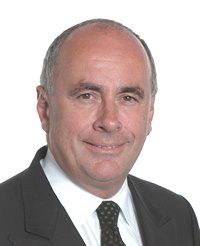 The next role for Carter has been the matter of some conjecture, nay gossip. Given Ofcom is seen by a lot of the world as a leader in communications regulation, there are many possible roles. Amoung those mentioned so far have been BSkyB, and with James Murdoch rumoured to be shifting upstairs the position may be open. Hey … how about the FCC?
The next role for Carter has been the matter of some conjecture, nay gossip. Given Ofcom is seen by a lot of the world as a leader in communications regulation, there are many possible roles. Amoung those mentioned so far have been BSkyB, and with James Murdoch rumoured to be shifting upstairs the position may be open. Hey … how about the FCC? The frequencies 1781.7-1785MHz paired with 1876.7-1880MHz known as the GSM Guard bands have been made available to 12 licensees under the Wireless Telegraphy Act. They are national UK licenses, though the operators of the licenses will have to cooperate amongst themselves so that interference between themselves doesn’t occur. Ofcom expect the licensees to form an industry body that will self-regulate. Operators will also be required to register all radio equipment in the “Sitefinder” database (currently populated by the GSM and 3G operators).
The frequencies 1781.7-1785MHz paired with 1876.7-1880MHz known as the GSM Guard bands have been made available to 12 licensees under the Wireless Telegraphy Act. They are national UK licenses, though the operators of the licenses will have to cooperate amongst themselves so that interference between themselves doesn’t occur. Ofcom expect the licensees to form an industry body that will self-regulate. Operators will also be required to register all radio equipment in the “Sitefinder” database (currently populated by the GSM and 3G operators). Winning Licensees
Winning Licensees New entrants could enter into roaming agreements with the current operators, but unless Ofcom mandates this (which is unlikely) there’s likely to be strong opposition. Since some of the license winners already have GSM networks, they can offer localised services knowing there’s no interference problems with existing infrastructure.
New entrants could enter into roaming agreements with the current operators, but unless Ofcom mandates this (which is unlikely) there’s likely to be strong opposition. Since some of the license winners already have GSM networks, they can offer localised services knowing there’s no interference problems with existing infrastructure. If you thought the switchover to digital television was going to be a challenge, spare a thought for the regulators, policy makers and engineers who are already tasked with trying to figure out the best way of re-allocating the spectrum freed up by switching off the analogue broadcasting signal.
If you thought the switchover to digital television was going to be a challenge, spare a thought for the regulators, policy makers and engineers who are already tasked with trying to figure out the best way of re-allocating the spectrum freed up by switching off the analogue broadcasting signal. The first two sessions focused mainly on the problems associated with harmonisation. It is essential that adjoining states will have to work together to allocate spectrum, if there are not to be interference issues. The ITU’s
The first two sessions focused mainly on the problems associated with harmonisation. It is essential that adjoining states will have to work together to allocate spectrum, if there are not to be interference issues. The ITU’s  Of course regulatory uncertainty is same for all those looking to unlock the digital dividend (although some argue that the broadcasters are well positioned because they already sit on the spectrum). Whatever happens its going to be a complex and highly political interplay between policy makers, regulators and transnational organisations such as the ITU.
Of course regulatory uncertainty is same for all those looking to unlock the digital dividend (although some argue that the broadcasters are well positioned because they already sit on the spectrum). Whatever happens its going to be a complex and highly political interplay between policy makers, regulators and transnational organisations such as the ITU.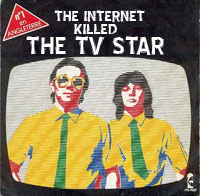 Big glasses-toting Buggles sang about ‘Video Killing The Radio Star’ back in 1979, but new figures from Ofcom suggest that the while Internet may not exactly be killing TV, it’s certainly giving it a bit of a duffing behind the bike sheds.
Big glasses-toting Buggles sang about ‘Video Killing The Radio Star’ back in 1979, but new figures from Ofcom suggest that the while Internet may not exactly be killing TV, it’s certainly giving it a bit of a duffing behind the bike sheds. Industry pundits are collaring the Internet as the reason for this decline, along with DVDs and gaming.
Industry pundits are collaring the Internet as the reason for this decline, along with DVDs and gaming.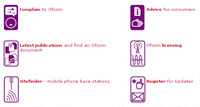 Consumer broadband continues its exponential growth, exploding from zero to 10 million connections in just over seven years, with some 70,000 new connections being added per week.
Consumer broadband continues its exponential growth, exploding from zero to 10 million connections in just over seven years, with some 70,000 new connections being added per week. For the second time in a fortnight, coastguards have been scrambled after a digital TV box sent out a signal on a wavelength used by ships in distress.
For the second time in a fortnight, coastguards have been scrambled after a digital TV box sent out a signal on a wavelength used by ships in distress.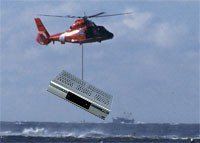 An Ofcom spokesman explained that the faulty boxes are now being examined for malfunctioning components, adding: “Apparently any device capable of receiving a signal can also send a signal if it malfunctions. To the best of our knowledge these are the only two out of millions of Freeview users in the UK to have experienced this problem.”
An Ofcom spokesman explained that the faulty boxes are now being examined for malfunctioning components, adding: “Apparently any device capable of receiving a signal can also send a signal if it malfunctions. To the best of our knowledge these are the only two out of millions of Freeview users in the UK to have experienced this problem.” So where do we start?
So where do we start?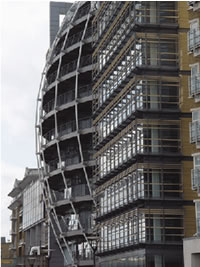 Naturally, there will always be those who say regulatory decisions made by organisations such as Ofcom are ‘independent’ and ‘evidence-based’ and therefore would be valid whoever happened to be in government. However, most people know Ofcom is ultimately a product of the government who created its remit – New Labour – and who on occasion have allowed the notion of ‘evidence-based’ regulation to underpin a culture of third party ‘experts’ who decide policy matters with a minimum of public participation or scrutiny.
Naturally, there will always be those who say regulatory decisions made by organisations such as Ofcom are ‘independent’ and ‘evidence-based’ and therefore would be valid whoever happened to be in government. However, most people know Ofcom is ultimately a product of the government who created its remit – New Labour – and who on occasion have allowed the notion of ‘evidence-based’ regulation to underpin a culture of third party ‘experts’ who decide policy matters with a minimum of public participation or scrutiny. If you were to consider UK telecoms, media, and technology (TMT) policy since Parliament passed the Communications Act 2003 and brought about the formation of Ofcom much has happened. The regulatory machinery of the state has swung into action with relative efficiency, taking on such issues as BT’s marketplace position, digital switchover, and public subsidy and control of broadcasting and new media. And we are starting – just starting – to see the results of some those efforts.
If you were to consider UK telecoms, media, and technology (TMT) policy since Parliament passed the Communications Act 2003 and brought about the formation of Ofcom much has happened. The regulatory machinery of the state has swung into action with relative efficiency, taking on such issues as BT’s marketplace position, digital switchover, and public subsidy and control of broadcasting and new media. And we are starting – just starting – to see the results of some those efforts.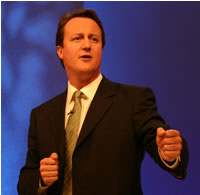 Certainly the party is already developing new ideas (or in some cases adopting the opposition’s cast-offs) in other policy areas. And by all accounts, David Cameron is doing an effective job of moving the Tories back toward the centre of British politics. The new leader appears flexible and open to new policy approaches. But nothing definite is happening in the TMT space. We think it should.
Certainly the party is already developing new ideas (or in some cases adopting the opposition’s cast-offs) in other policy areas. And by all accounts, David Cameron is doing an effective job of moving the Tories back toward the centre of British politics. The new leader appears flexible and open to new policy approaches. But nothing definite is happening in the TMT space. We think it should.